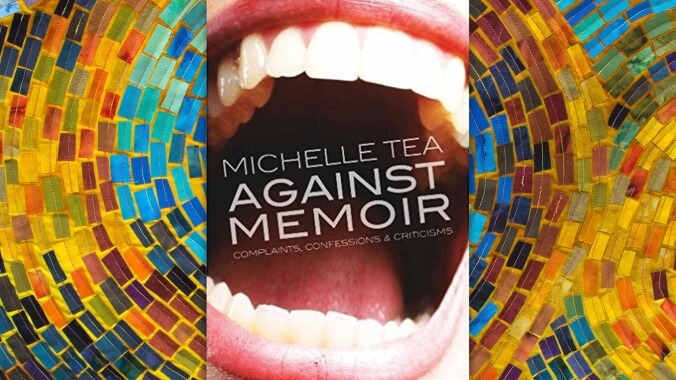
In previous memoirs like The Chelsea Whistle and How To Grow Up, Michelle Tea brilliantly captured the seething desires of adolescence and the growing pains of reluctant maturity. Her new book is just as raw, just as honest, just as gorgeously punk-rock rebellious, but instead of being about her lived experiences, Against Memoir: Complaints, Confessions & Criticisms focuses on Tea’s influences: books, art, music, subcultures.
The collection of essays is divided into three sections: “Art & Music,” “Love & Queerness,” and “Writing & Life,” moving from the more cerebral to the more personal. The start of the first essay, “On Valerie Solanas,” sets the tone: “I was thinking a certain way when I first came across the SCUM Manifesto. I had retreated into the desert of Tucson, Arizona, in the midst of what I now refer to as my Radical Lesbian Feminist Nervous Breakdown. I make light of it, but it was a dark and dangerous moment of my life.” Tea does this with many of the dark and dangerous moments in this book—she doesn’t exactly make light of them, but she describes them with a clear-eyed honesty that allows her sense of humor to cut through the pain. For Tea, the radical feminist Manifesto (whose author would shoot Andy Warhol in 1968) is “outlandish,” contradictory, and “a very unfunny critique of American culture,” but reading it comforts her; it shows Tea that she is not alone in being audaciously female, audaciously queer, and completely unaccepting of misogyny.
Other offbeat influences that Tea praises are the movie Times Square (which “shows beautifully what is lost to us when we lose our cities, our scruffy, scuzzy, cheap, and accessible cities”), the performance artist Erin Markey (whose one-woman show is “a sex work narrative, but in the form of a musical”), and the band Gene Loves Jezebel (whose “image was, like, androgynous incestuous brothers”). Tea anchors both the well-known and the obscure in her own experiences, which invites readers to experience these books, films, bands, and movements on their own quirky terms.
The second section, “Love & Queerness,” is a blend of journalistic reporting and private confessional. “HAGS In Your Face” tells the history of a San Francisco group of “magnificent and terrifying dykes.”“Transmissions From Camp Trans” chronicles the fallout after trans women were barred from the Michigan Womyn’s Music Festival in 1991 and set up a protest camp down the road. “Polishness” is more intimate and struggles to find “difficult beauty” in a city tinged even grayer by heartbreak. Even at their most personal, these essays comment on larger social and cultural issues with both nuance and clarity.
The last section, “Writing & Life,” is more of a return to memoir. Tea is at her best in this book when she uses her own experiences as a lens through which to see a piece of art or a cultural shift. “The Summer Of Lost Jobs” tells exactly that story, the details she includes (such as getting fired from a T-shirt shop for wearing “clown white” makeup) making it rise far above a series of anecdotes. “Sister Spit Feminism” is another succession of stories about her “all-girl performance tour that tore up the United States at the end of the last century,” but, again, Tea smoothly and poignantly weaves social and critical commentary into her narratives:
It was stunning. To have our improbable ambitions validated. To have the chips on our shoulders polished and praised… Our tour across America proved to all of us that our writing was important… And it gave us a platform to spectacularly misbehave, to feel temporarily invincible, to feel safe in a world that had taught us firsthand to fear it.
“Against Memoir,” the final essay, starts by considering the thoughts that keep her up at night—the realization that she will never again be 16, the possibility that there is no god, and, the biggest of them, the compulsion she feels to write memoir. She questions the ethics of the form, and the responsibilities of the writer. Writing memoir can be cruel, exploitive, narcotic, “the least Buddhist thing you can do,” but Tea, a recovering alcoholic, does not “want to get sober from writing.” “I can’t imagine who I would be without writing,” she writes. “I guess it’s enough to just know this. I guess it’s enough to simply be aware because I don’t want to get better, sober or whatever.”
And what a happy thing this is for readers. Michelle Tea may settle into a sobriety from alcohol, a sobriety of family, a sobriety of intellectual thought, but her writing will always be wild with sex and desire and music and art, always reaching to discover a new “difficult beauty,” and leaving her readers high—on writing and life.